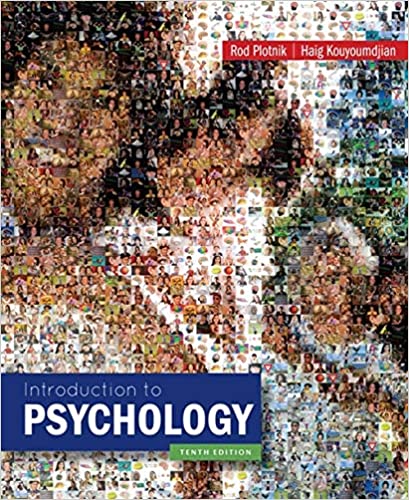
Introduction to Psychology 10th Edition by Rod Plotnik,Haig Kouyoumdjian
Edition 10ISBN: 978-1133939535
Introduction to Psychology 10th Edition by Rod Plotnik,Haig Kouyoumdjian
Edition 10ISBN: 978-1133939535 Exercise 26
Brain-Boosting Drugs: Myth or Fact?
Currently, there is major controversy among scientists, educators, and others over the rapidly increasing number of healthy people turning to "brainboosting" drugs to enhance their mental performance. The main drugs being used for this purpose are Ritalin ("Vitamin R"), which is used to treat ADHD, and Provigil, which is used to treat sleep disorders. College campus surveys show that nearly 25% of college students use these medications without a prescription, not while partying to get a high but to help with studying.
These drugs can improve a variety of mental skills in healthy people, such as increasing concentration time on a task, reducing time needed to solve puzzles, and improving memory of a series of numbers. Provigil can even help people go for days without sleeping, all while improving their mental performance. As impressive as these drugs may sound, their long-term risks on healthy people are unknown.
Of course, dosing up on stimulant medications to improve focus and energy is nothing new. Amphetamines and other stimulant drugs have long been used for this purpose. And let's remember that almost all of us drink caffeinated beverages to feel more upbeat, alert, and focused. Many college students drink caffeinated beverages, sometimes caffeine-pumped energy drinks, to stay awake studying for an exam or completing a term paper. But how much does caffeine actually boost our brains?
Research shows that after consuming caffeine (two cups of coffee), people have faster reaction times and increased activity in the areas of the brain responsible for memory and attention. The data are so strong that the U.S. military now provides pilots with caffeinated gum in the cockpit and provides troops with caffeinated meals.
Drinking small to moderate amounts of caffeine may improve your memory and attention, but this doesn't mean caffeine makes us smarter. As a research psychologist, Harris Lieberman, says, "I use the word intelligence as an inherent trait, something permanently part of your makeup" (Lemonick, 2006, p. 95). He explains that caffeine cannot change intelligence, but what it can do is improve your attention, mood, and energy level. For instance, when you're feeling drowsy and you take caffeine, many intellectual functions, such as attention, logical reasoning, and reaction time, improve. Thus, though caffeine cannot make you more intelligent, it can help you to better use the intellectual abilities you already have. The same can be said about other so-called brain boosting drugs, such as Ritalin and Provigil.
Question
What are some of the dangers of sleep deprivation?
Currently, there is major controversy among scientists, educators, and others over the rapidly increasing number of healthy people turning to "brainboosting" drugs to enhance their mental performance. The main drugs being used for this purpose are Ritalin ("Vitamin R"), which is used to treat ADHD, and Provigil, which is used to treat sleep disorders. College campus surveys show that nearly 25% of college students use these medications without a prescription, not while partying to get a high but to help with studying.
These drugs can improve a variety of mental skills in healthy people, such as increasing concentration time on a task, reducing time needed to solve puzzles, and improving memory of a series of numbers. Provigil can even help people go for days without sleeping, all while improving their mental performance. As impressive as these drugs may sound, their long-term risks on healthy people are unknown.
Of course, dosing up on stimulant medications to improve focus and energy is nothing new. Amphetamines and other stimulant drugs have long been used for this purpose. And let's remember that almost all of us drink caffeinated beverages to feel more upbeat, alert, and focused. Many college students drink caffeinated beverages, sometimes caffeine-pumped energy drinks, to stay awake studying for an exam or completing a term paper. But how much does caffeine actually boost our brains?
Research shows that after consuming caffeine (two cups of coffee), people have faster reaction times and increased activity in the areas of the brain responsible for memory and attention. The data are so strong that the U.S. military now provides pilots with caffeinated gum in the cockpit and provides troops with caffeinated meals.
Drinking small to moderate amounts of caffeine may improve your memory and attention, but this doesn't mean caffeine makes us smarter. As a research psychologist, Harris Lieberman, says, "I use the word intelligence as an inherent trait, something permanently part of your makeup" (Lemonick, 2006, p. 95). He explains that caffeine cannot change intelligence, but what it can do is improve your attention, mood, and energy level. For instance, when you're feeling drowsy and you take caffeine, many intellectual functions, such as attention, logical reasoning, and reaction time, improve. Thus, though caffeine cannot make you more intelligent, it can help you to better use the intellectual abilities you already have. The same can be said about other so-called brain boosting drugs, such as Ritalin and Provigil.
Question
What are some of the dangers of sleep deprivation?
Explanation
Sleep deprivation is a condition of slee...
Introduction to Psychology 10th Edition by Rod Plotnik,Haig Kouyoumdjian
Why don’t you like this exercise?
Other Minimum 8 character and maximum 255 character
Character 255


